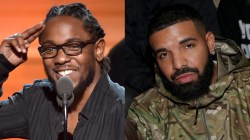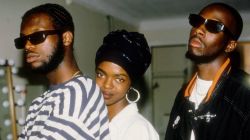First of all, don’t let the name fool you — I am a woman named Kyle. Throughout my decade-long journalism career, which has morphed into a Hip Hop-centric dream, I’ve often struggled with the rampant misogyny that ripples throughout the culture. Much like fellow HipHopDX writer Aaron McKrell, who reflected on his relationship to misogynistic imagery and lyrics as a teenager, I was once unfazed by the repeated use of “bitch,” “ho” and whatever other derogatory name being used to reference a female.
There I was, 14 years old and loving Dr. Dre’s The Chronic, Beastie Boys’ License To Ill and Too Short’s Cocktails, and not realizing the possible damage it could have inflicted on my self-esteem and how I viewed myself as a young girl. On the other hand, when it came to female artists, I idolized Queen Latifah, Erykah Badu and feminist punk rock pioneers like Kathleen Hanna of Bikini Kill and Le Tigre.
Who you callin’ a bitch?

AD LOADING...
I admired these strong symbols of feminism and yet at the same time, was allowing myself to be sonically assaulted by the men making the music I loved. Even more confusing were the images of the “ideal woman” (or what we’d perhaps call “video vixens” today) that somehow us “regular” women were supposed to live up to, which to most, is nearly an impossible feat.
As I got older and entered my 30s, I soon found myself skipping songs like “Girls Girls Girls” by the Beastie Boys, “Bitches Ain’t Shit” by Dr. Dre and N.W.A’s “A Bitch Iz A Bitch” when they’d start playing on my iPod, even though they’re on some of my favorite albums of all time. It wasn’t cute anymore (actually, it probably never was).
Ms. Badu emerged with her seminal album Baduizm in February 1997 and managed to quickly gain respect without overtly sexualizing her image.

AD LOADING...
Compounding the issue even further was the sudden emergence of hyper-sexualized female MCs like Lil Kim or Foxy Brown, whose blatant sensuality was used to package their music. While they clearly had skills as lyricists and MCs, their reliance on the “sex sells” concept was admittedly distracting. At the time, however, this was an anomaly.
Predecessors like Funky 4 + 1’s MC Sha Rock and Queen Latifah certainly weren’t half-naked while rapping, and neither were MC Lyte and Roxanne Shanté. They relied on skill alone to woo their fans.
https://www.youtube.com/watch?v=YpRfpk311NU
Lil Kim released Hardcore in 1996 and took the “sex sells” concept to a whole other level.

AD LOADING...
Fast-forward to 2017 and female artists are practically expected to take off their clothes for attention. In a conversation I had with an important mentor of mine, Public Enemy mastermind Chuck D, we were talking about the over-sexualization of the female rapper, and he asked, “Where are the female MCs standing up on stage with a turtleneck on rapping their asses off and getting accolades for their skills?”
Presumably, he didn’t really mean an actual turtleneck (because let’s be honest—no one wears those anymore except maybe Alfonso Ribeiro) — he meant that Hip Hop no longer has a bevy of strong, female and truly gifted MCs not taking their clothes off at the forefront of mainstream culture.
Take Nicki Minaj, for example. The self-described “Barbie” is a mediocre rapper at best as illustrated by her recent guest spot on Gucci Mane’s “Make Love.”
“I rep Queens where they listen to a bunch of Nas/I’m a yes and these bitches is a bunch of nahs/Tryin’ to win a gunfight with a bunch of knives,” she spits, pronouncing “knives” as “kn-ah-ves” to rhyme with “nahs.”

AD LOADING...
Really, Nicki? What she lacks in skill, she attempts to make up for with her sex-ed up image. Let’s not forget, she rapped her whole verse while straddling an inflatable unicorn wearing not much more than a skimpy bathing suit, and is also the same woman who posed for the sexually explicit cover of her “Anaconda” single.
Is this what women in the music industry have been reduced to? A different path was there in our sights once upon a time. We had Lauryn Hill, the aforementioned Queen, Bahamadia, Missy Elliott, The Lady Of Rage, Ladybug Mecca, and Monie Love.
While there are current indications that some women want to be known for their lyrical ability rather than how big their butts are (i.e. Ill Camille, Psalm One, Rapsody), will they ever be able to attain the level of success artists like Nicki has without taking their clothes off? Probably not.
In the meantime, I hope to do everything I can to shift the focus from the superficial to the super-cerebral. Why? Because it’s about time women are treated with respect and not solely an object of desire.

![Diddy Denied Bail: Judge Cites ‘Compelling Evidence Of [His] Propensity For Violence’](https://app.hiphopdx.com/wp-content/uploads/2024/11/diddy-denied-bail-judge-cites-compelling-evidence-of-his-propensity-for-violence.jpg?w=250)

